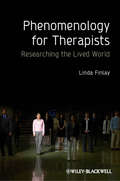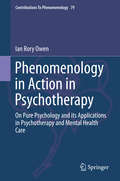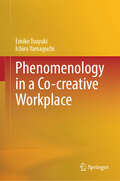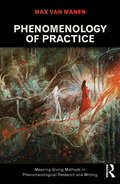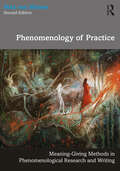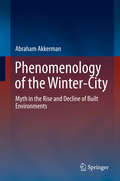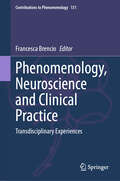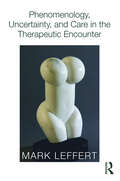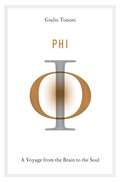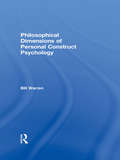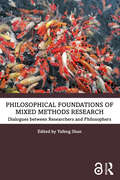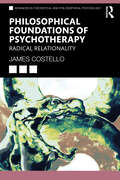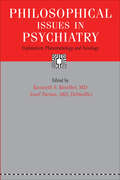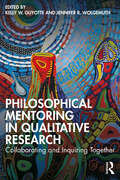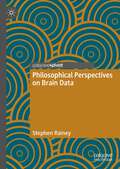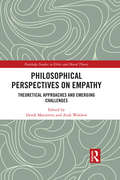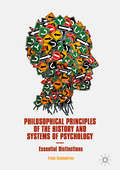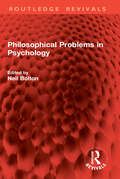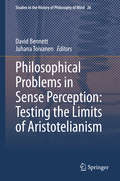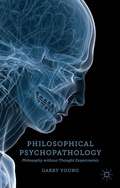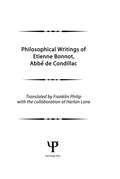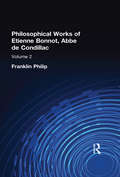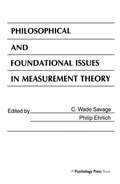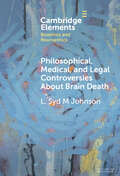- Table View
- List View
Phenomenology for Therapists
by Linda FinlayThis book provides an accessible comprehensive exploration of phenomenological theory and research methods and is geared specifically to the needs of therapists and other health care professionals. An accessible exploration of an increasingly popular qualitative research methodologyExplains phenomenological concepts and how they are applied to different stages of the research process and to topics relevant to therapy practiceProvides practical examples throughout
Phenomenology in Action in Psychotherapy
by Ian Rory OwenThis book takes Edmund Husserl's phenomenology and applies it to help psychotherapy practitioners formulate complex psychological problems. The reader will learn about Husserl's system of understanding and its concepts that can point to first-person lived experience, and about the work of Husserl scholars who have developed a way to be precise about the experiences that clients have. Through exploring the connection between academic philosophy of consciousness and mental health, themes of biopsychosocial treatment planning, psychopathology of personality and psychological disorders, and the treatment of complex psychological problems all emerge. The author shows that Husserlian phenomenology can be used in the design of interventions for each client in a process called formulation. Once the intentionality of consciousness of an individual is understood, by asking simple questions, it becomes possible to define problematic experiences. This is a means of creating informed consent for treatment and it also makes it clear to clients what is happening for them, so helping them understand themselves and how they see the world. We also see how Husserl's phenomenology is a vehicle for psychotherapists to present their knowledge about the research literature of what has been found to be effective care. This volume applies the concepts and practices of phenomenology in a concrete way, relating them to the practice of therapy and showing the value of a qualitative approach to understanding mental processes and the nature of human beings as motivated by values, meanings and other conscious experiences. This is a readable text in simple language that condenses key aspects of Husserl's thinking in relation to the theory and practice of psychotherapy, and it is suitable for philosophers and practitioners of psychology, psychiatry, and the psychotherapies, including psychoanalysis.
Phenomenology in a Co-creative Workplace
by Ichiro Yamaguchi Emiko TsuyukiThis book introduces phenomenology to reveal how the atmosphere and relationships in the workplace are generated and how this affects creativity. In their daily work, people sometimes feel that "today's meeting was more exciting than expected" or that "everyone's motivation is down”. This unspoken workplace atmosphere has a significant impact on their work. But has enough thought been given to how this workplace atmosphere is created? Phenomenology reveals the basic structure of human relationships in the workplace. Are there any general rules that govern human interaction and the nature of relationships in that workplace? If these unspoken rules can be made explicit – clearly felt and spoken — people can work together to bring about a creative workplace in which individuals can maximize their abilities. The main point of the book is that human relationships are based on a two-layered structure: "emotional communication", which is rooted in human sensitivity and centers on sensation and emotion; and "verbal communication", which is based on shared intelligence and relies upon language and thought. The invisible layer of emotional communication is always at work as the foundation of verbal communication, creating what can be described as the "workplace atmosphere”. This book offers a new perspective on promoting creativity in the workplace by unraveling the principles behind the structure of workplace atmospheres.
Phenomenology of Practice: Meaning-Giving Methods in Phenomenological Research and Writing (Developing Qualitative Inquiry #13)
by Max Van ManenMax van Manen offers an extensive exploration of phenomenological traditions and methods for the human sciences. It is his first comprehensive statement of phenomenological thought and research in over a decade. Phenomenology of practice refers to the meaning and practice of phenomenology in professional contexts such as psychology, education, and health care, as well as to the practice of phenomenological methods in contexts of everyday living. Van Manen presents a detailed description of key phenomenological ideas as they have evolved over the past century; he then thoughtfully works through the methodological issues of phenomenological reflection, empirical methods, and writing that a phenomenology of practice offers to the researcher. Van Manen's comprehensive work will be of great interest to all concerned with the interrelationship between being and acting in human sciences research and in everyday life. Max van Manen is the editor of the series Phenomenology of Practice, https://www.routledge.com/series/PPVM
Phenomenology of Practice: Meaning-Giving Methods in Phenomenological Research and Writing (Phenomenology of Practice)
by Max van ManenMax van Manen offers an extensively updated edition of Phenomenology of Practice: Meaning-Giving Methods in Phenomenological Research and Writing to provide an eloquent, accessible, and detailed approach to practicing phenomenology. Phenomenology of practice refers to the meaning of doing phenomenology on experiences that are of significance to those in professional practice such as psychology, health care, education, and in contexts of ordinary living. A special feature of this update is the role of examples, anecdotes, stories, and vignettes, and the singularity of fictionalized empirical fragments in making the unknowable knowable. Accordingly, the various chapters are enriched with many intelligible examples of phenomenological essays and excursions on ordinary and extraordinary topics. These examples show that a phenomenological method can be engaged to explore virtually any lived experience or event. Max van Manen provides penetrating portrayals of depthful insights by brilliant phenomenologists. He identifies and distinguishes a variety of phenomenological orientations that are alive and current today. This book is relevant to scholars, students, and motivated readers interested in the originary meanings and methods of phenomenological human science enquiry. Max van Manen’s comprehensive work is of significance to all concerned with the interrelation between being and acting, thoughtfulness and tact, in human sciences research and the phenomenology of everyday life.
Phenomenology of the Winter-City
by Abraham AkkermanThis book explores how the weather and city-form impact the mind, and how city-form and mind interact. It builds on Merleau-Ponty's contention that mind, the human body and the environment are intertwined in a singular composite, and on Walter Benjamin's suggestion that mind and city-form, in mutual interaction, through history, have set the course of civilization. Bringing together the fields of philosophy, urbanism, geography, history, and architecture, the book shows the association of existentialism with prevalence of mood disorder in Northern Europe at the close of Little Ice Age. It explains the implications of city-form and traces the role of the myths and allegories of urban design as well as the history of gender projection onto city-form. It shows how urbanization in Northern Europe provided easier access to shelter, yet resulted in sunlight deprivation, and yielded increasing incidence of depression and other mental disorder among the European middle-class. The book uses the examples of Kierkegaard, Nietzsche, Dostoevsky and Kafka, to show how walking through the streets, squares and other urban voids became the informal remedy to mood disorder, a prominent trait among founders of modern Existentialism. It concludes by describing how the connection of anguish and violence is relevant to winter depression in cities, in North America in particular.
Phenomenology, Neuroscience and Clinical Practice: Transdisciplinary Experiences (Contributions to Phenomenology #131)
by Francesca BrencioThis book offers fundamental insights into three main fields of education and expertise: phenomenology, neuroscience, and clinical practice. The richness and pluralism of the contributions aim to overcome the reductionist and dualistic approach to mental health and shed new light on clinical practice. Designed as both an education tool for mental health professionals, and a theoretical investigation for philosophers on the use of phenomenology in clinical practice, this book highlights the need for a new direction on mental health, and more general, on human wellbeing. This volume aims to fill the gap between philosophers and mental health professionals on an educational level, in a space unique in its open and transdisciplinary approach. It appeals to students and researchers but also very much to professionals and clinicians in the field.
Phenomenology, Uncertainty, and Care in the Therapeutic Encounter
by Mark LeffertPhenomenology, Uncertainty and Care in the Therapeutic Encounter is the latest in a series of books where Mark Leffert explores the therapeutic encounter as both process and situation; looking for evidence of therapeutic effectiveness rather than accepting existing psychoanalytic concepts of theory or cure without question. Mark Leffert focuses on the uncomfortable fact that analysts and therapists can and do make many mistaken assumptions and false moves within their clinical practice, and that there is a tendency to ignore the significant levels of uncertainty in what they do. Beginning with a discussion of the phenomenology of the self and its relations with the world, the book moves on to explore the notion that interdisciplinary discourse both opens up possibilities in the therapeutic encounter but also imposes healthy constraints on what can be thought or theorized about psychoanalytically. Phenomenology, Uncertainty and Care in the Therapeutic Encounter contributes a new understanding of familiar material and brings a new focus to the care-giving and healing aspects of psychoanalysis and psychotherapy leading to a shift in the analyst’s identity from that of one who analyses to one who cares for and heals. This book will be of interest to Psychoanalysts and psychotherapists, neuroscientists and academics in the fields of psychiatry, comparative literature and literature and the mind.
Phi: A Voyage from the Brain to the Soul
by Giulio TononiThis title is printed in full color throughout.From one of the most original and influential neuroscientists at work today, here is an exploration of consciousness unlike any other--as told by Galileo, who opened the way for the objectivity of science and is now intent on making subjective experience a part of science as well. Galileo's journey has three parts, each with a different guide. In the first, accompanied by a scientist who resembles Francis Crick, he learns why certain parts of the brain are important and not others, and why consciousness fades with sleep. In the second part, when his companion seems to be named Alturi (Galileo is hard of hearing; his companion's name is actually Alan Turing), he sees how the facts assembled in the first part can be unified and understood through a scientific theory--a theory that links consciousness to the notion of integrated information (also known as phi). In the third part, accompanied by a bearded man who can only be Charles Darwin, he meditates on how consciousness is an evolving, developing, ever-deepening awareness of ourselves in history and culture--that it is everything we have and everything we are. Not since Gödel, Escher, Bach has there been a book that interweaves science, art, and the imagination with such originality. This beautiful and arresting narrative will transform the way we think of ourselves and the world.
Philosophical Dimensions of Personal Construct Psychology (Routledge Progress in Psychology)
by Bill WarrenThis book traces the philosophical history of Personal Construct Psychology through the broad and complex tradition of phenomenology and thinkers such as Spinoza, Hegel and Heidegger. The author also gives credit to the influence of general creative and dramatic literature across a variety of cultures. Specific issues addressed in depth include the position of Personal Construct Psychology with regard to philosophy of science, determinism and free will, concepts of mental illness and the implications for social and political philosophy.
Philosophical Foundations of Mixed Methods Research: Dialogues between Researchers and Philosophers
by Yafeng ShanPhilosophical Foundations of Mixed Methods Research provides a comprehensive examination of the philosophical foundations of mixed methods research. It offers new defences of the seven main approaches to mixed methods (the pragmatist approach, the transformative approach, the indigenous approach, the dialectical approach, the dialectical pluralist approach, the performative approach, and the realist approach) written by leading mixed methods researchers. Each approach is accompanied by critical reflections chapter from philosophers’ point of view. The book shows the value of the use of mixed methods from a philosophical point of view and offers a systematic and critical examination of these positions and approaches from a philosophical point of view. The volume also offers a platform to promote a dialogue between mixed methods researchers and philosophers of science and provides foundations for further research and teaching of this hotly debated topic. This volume is ideal for researchers and advanced students, and anyone who is interested in research methods and the social sciences more generally.
Philosophical Foundations of Psychotherapy: Radical Relationality (Advances in Theoretical and Philosophical Psychology)
by James CostelloPhilosophical Foundations of Psychotherapy promotes a critical understanding of the ideas, traditions, values, and principles that inform and shape – for better or for worse – what therapists do.The book challenges the unhelpful misconception that philosophy is for philosophers alone, because human reality is too complex for therapists to be unaware of the foundations, difficulties, and contradictions within our value systems, ethics, and assumptions. By retrieving attitudes from other times and other places, traversing the relational contours of history right up to contemporary thinkers and practitioners, the author argues that not only do relationships heal, but they offer the only safe harbour in life’s sea of troubles. He promotes a conscientious radical relationality, which remains attentive to its influences, including contemporary debates about our neoliberal selves, the superstructures of culture, and the ethics of authenticity. In stepping back from the sometimes- narrow concerns of our therapeutic methods, the book explores broader themes important for living well: what is the good of therapy, how do we reconcile our sense of futility in the face of an indifferent universe, postcolonial debates, responses to disembodied artificial intelligence, and alternatives to our human- centred stance towards Nature.This book is primarily for practitioners, trainees, and educators, but ultimately it is intended for the greater good of clients and those interested in what therapeutic practices and practitioners have to offer. It will also be useful for those teaching research methods, the practice of research supervision, reflexivity, and personal development, across all areas related to mental health.
Philosophical Issues in Psychiatry: Explanation, Phenomenology, and Nosology (International Perspectives In Philosophy And Psychiatry Ser.)
by Kenneth S. Kendler Josef Parnas, M.D., Dr.Med.Sci.This multidisciplinary collection explores three key concepts underpinning psychiatry—explanation, phenomenology, and nosology—and their continuing relevance in an age of neuroimaging and genetic analysis.An introduction by Kenneth S. Kendler lays out the philosophical grounding of psychiatric practice. The first section addresses the concept of explanation, from the difficulties in describing complex behavior to the categorization of psychological and biological causality. In the second section, contributors discuss experience, including the complex and vexing issue of how self-agency and free will affect mental health. The third and final section examines the organizational difficulties in psychiatric nosology and the instability of the existing diagnostic system. Each chapter has both an introduction by the editors and a concluding comment by another of the book’s contributors.Contributors: John Campbell, Ph.D.; Thomas Fuchs, M.D., Ph.D.; Shaun Gallagher, Ph.D.; Kenneth S. Kendler, M.D.; Sandra D. Mitchell, Ph.D.; Dominic P. Murphy, Ph.D.; Josef Parnas, M.D., Dr.Med.Sci.; Louis A. Sass, Ph.D.; Kenneth F. Schaffner, M.D., Ph.D.; James F. Woodward, Ph.D.; Peter Zachar, Ph.D.
Philosophical Mentoring in Qualitative Research: Collaborating and Inquiring Together
by Kelly W. Guyotte Jennifer R. WolgemuthWith contributions from advanced, early career, and emerging qualitative scholars, Philosophical Mentoring in Qualitative Research illuminates how qualitative research mentoring practices, relationships, and possibilities of inquiry and teaching come to life under different mentoring philosophies. What we can know in and about the world is inseparable from our approach(es) to knowing with and in it. And how we mentor in qualitative research matters to what we can know and do as qualitative inquirers. Yet, despite its importance, mentoring is rarely conceptualized as a practice inspiring or inspired by philosophy. This edited book opens a needed space for thinking about mentoring as a philosophical practice. Its thoughtful chapters and artful "mentoring moments" draw on critical, feminist, new materialist, post-structuralist, and other philosophies to make visible, interrupt, reflect, deepen, and expand mentoring practices within the qualitative community revealing what we can know, do, and become through them. Philosophical Mentoring in Qualitative Research sensitizes readers to mentoring as a philosophical practice. As such, it is essential reading for students and researchers in qualitative research and higher education interested in mentoring practice and humanistic research values.
Philosophical Perspectives on Brain Data
by Stephen RaineyWhere there is data there are questions of ownership, leaks, and worries about misuse. When what’s at stake is data on our brains, the stakes are high. This book brings together philosophical analysis and neuroscientific insights to develop an account of ‘brain data’: what it is, how it is used, and how we ought to take care of it. Emerging trends in neuroscience appear to make mental activity legible, through sophisticated processing of signals recorded from the brain. This can include Artificial Intelligence (AI), with algorithms classifying brain signals for further processing. These developments will have ramifications for concepts of the brain, the self, and the mind. They will also affect clinical practices like psychiatry, by modifying concepts of mental health and introducing AI-based diagnostic and treatment strategies. The issues arising are vastly complicated, little understood, but of high importance. Philosophical Perspectives on Brain Data clarifies complex intersections of philosophical and neuroscientific interest, presenting an account of brain data that is comprehensible. This account can be the basis for evaluating practices based on brain data. As such, the book aims to open a novel space for evaluating hitherto arcane areas of academic research in order to provide the necessary scope for understanding their real-world consequences. These consequences will include personal, socio-political, and public health dimensions. It is therefore vital that they are understood if their impacts upon aspects of everyday life can be evaluated adequately.
Philosophical Perspectives on Empathy: Theoretical Approaches and Emerging Challenges (Routledge Studies in Ethics and Moral Theory)
by Anik Waldow Derek MatraversEmpathy—our capacity to cognitively or affectively connect with other people’s thoughts and feelings—is a concept whose definition and meaning varies widely within philosophy and other disciplines. Philosophical Perspectives on Empathy advances research on the nature and function of empathy by exploring and challenging different theoretical approaches to this phenomenon. The first section of the book explores empathy as a historiographical method, presenting a number of rich and interesting arguments that have influenced the debate from the Nineteenth Century to the present day. The next group of essays broadly accepts the centrality of perspective-taking in empathy. Here the authors attempt to refine and improve this particular conception of empathy by clarifying the intentionality of the perspective taker’s emotion, the perspective taker’s meta-cognitive capacities, and the nature of central imagining itself. Finally, the concluding section argues for the re-evaluation, or even rejection, of empathy. These essays advance alternative theories that are relevant to current debates, such as narrative engagement and competence, attunement or the sharing of mental states, and the "second-person" model of empathy. This book features a wide range of perspectives on empathy written by experts across several different areas of philosophy. It will be of interest to researchers and upper-level students working on the philosophy of emotions across ethics, philosophy of mind, philosophy of psychology, and the history of philosophy.
Philosophical Principles of the History and Systems of Psychology: Essential Distinctions
by Frank ScalambrinoTaking philosophical principles as a point of departure, this book provides essential distinctions for thinking through the history and systems of Western psychology. The book is concisely designed to help readers navigate through the length and complexity found in history of psychology textbooks. From Plato to beyond Post-Modernism, the author examines the choices and commitments made by theorists and practitioners of psychology and discusses the philosophical thinking from which they stem. What kind of science is psychology? Is structure, function, or methodology foremost in determining psychology's subject matter? Psychology, as the behaviorist views it, is not the same as the psychoanalyst's view of it, or the existentialist's, so how may contemporary psychology philosophically-sustain both pluralism and incommensurability? This book will be of great value to students and scholars of the history of psychology.
Philosophical Problems in Psychology (Routledge Revivals)
by Neil BoltonPhilosophical psychology reflects upon the aims and the concepts of empirical psychology. First published in 1979, Philosophical Problems in Psychology argues that empirical psychology must be founded upon the language of rationality, for actions and the reasons people give for their actions are at the heart of human behaviour.This thesis is defended in the contributions to Part I which assert that psychology must take the form of an elaboration of common sense. But the authors in Part II maintain that psychology may remain faithful to this insight whilst still developing more sophisticated models of behaviour. The use of computer models, Piaget’s views on the effects of internalization and a discussion of the geometry of phenomenal space provide illustrations. Part III contains three papers which explore the limitations of theoretical statements which emphasize our construction of reality. The pertinence of the computer analogy is disputed, subject-centred models are scrutinized in the light of phenomenology, and the role of theory in psychotherapy is critically discussed.
Philosophical Problems in Sense Perception: Testing the Limits of Aristotelianism (Studies in the History of Philosophy of Mind #26)
by David Bennett Juhana ToivanenThis volume focuses on philosophical problems concerning sense perception in the history of philosophy. It consists of thirteen essays that analyse the philosophical tradition originating in Aristotle’s writings. Each essay tackles a particular problem that tests the limits of Aristotle’s theory of perception and develops it in new directions. The problems discussed range from simultaneous perception to causality in perception, from the representational nature of sense-objects to the role of conscious attention, and from the physical/mental divide to perception as quasi-rational judgement. The volume gives an equal footing to Greek, Arabic, and Latin philosophical traditions. It makes a substantial contribution not just to the study of the Aristotelian analysis of sense perception, but to its reception in the commentary tradition and beyond. Thus, the papers address developments in Alexander of Aphrodisias, Themistius, Avicenna, John of Jandun, Nicole Oresme, and Sayf al-Din al-Amidi, among others. The result of this is a coherent collection that attacks a well-defined topic from a wide range of perspectives and across philosophical traditions.
Philosophical Psychopathology
by Garry YoungThis book uses rare pathologies to inform questions on topics such as consciousness and rationality. Rather than trying to answer these by inventing far-fetched scenario or 'thought experiments', it is better to utilize a rich but under-used clinical resource.
Philosophical Works of Etienne Bonnot, Abbe De Condillac: Volume 1
by F. Philip H. LaneThis highly readable translation of the major works of the 18th- century philosopher Etienne Bonnot, Abbe de Condillac, a disciple of Locke and a contemporary of Rousseau, Voltaire, and Diderot, shows his influence on psychiatric diagnosis as well as on the education of the deaf, the retarded, and the preschool child. Published two hundred years after Condillac's death, this translation contains treatises which were, until now, virtually unavailable in English: A Treatise on Systems, A Treatise of the Sensations, Logic.
Philosophical Works of Etienne Bonnot, Abbe De Condillac: Volume II
by Franklin PhilipThis is the first English translation of Condillac's most influential works: the Essay on the Origins of Human Knowledge (1746) and Course for Study of Instruction of the Prince of Parma (1772). The Essays lay the foundation for Condillac's theory of mind. He argues that all mental operations are, in fact, sensory processes and nothing more. An outgrowth of Locke's empirical account of ideas and sensations as a source of knowledge, Condillac's theory goes beyond Locke's foundations, introducing his universal method for understanding any complex entity: the reduction of all matters to their origins and then to their simplest forms. The Course, originally written to teach Prince Ferdinand of Parma to think and to develop good habits of mind following the principle of association of ideas, covers grammar, writing, reasoning, thinking, and ancient and modern history. Philip writes in the introduction: "[the] mind is moldable to reason and to 'nature' which gave it a model and provides the ultimate authority for all it can know or do."
Philosophical and Foundational Issues in Measurement Theory
by C. Wade Savage Philip EhrlichMeasurement theory has only recently become recognized as a legitimate, specialized field of inquiry. This text covers a wide range of issues of central concern to contemporary measurement theorists, and a broad range of philosophical perspectives are represented. The formalist, representationalist approach defines measurement as the assignment of numbers to entities and events to represent their properties and relations. It also states that measurement theory is supposed to analyze the concept of a scale of measurement, describe various types of scales and their uses, and formulate the conditions required for the existence of scales of various types. Since this approach dominates contemporary measurement theory, the volume begins with essays by some of its leading architects. In order to allow for diverse points of view, the book also includes articles that attempt to broaden this approach, and several that even criticize the approach.
Philosophical, Medical, and Legal Controversies About Brain Death (Elements in Bioethics and Neuroethics)
by L. Syd JohnsonThis Element considers current legal, ethical, metaphysical, and medical controversies concerning brain death. It examines the implicit metaphysical and moral commitments and dualism implied by neurological criteria for death. When these commitments and worldview are not shared by patients and surrogates, they give rise to distrust in healthcare providers and systems, and to injustice, particularly when medicolegal definitions of death are coercively imposed on those who reject them. Ethical obligations to respect persons and patient autonomy, promote patient-centered care, foster and maintain trust, and respond to the demands of justice provide compelling ethical reasons for recognizing reasonable objections. Each section illustrates how seemingly academic debates about brain death have real, on-the-ground implications for patients and their families.
Philosophie der Führung
by Dieter Frey Lisa Katharin SchmalzriedFührungskräfte arbeiten heute in einem unsicheren Umfeld mit wachsenden Anforderungen und immer variableren Rahmenbedingungen. Dennoch müssen sie Sicherheit ausstrahlen und ihren Mitarbeitern eine Orientierung bieten. Viele Führungskräfte empfinden dies als belastend und suchen nach einer Art Kompass, an dem sie ihr Handeln ausrichten können, nach dauerhaften Prinzipien für eine "gute Führung". Dieses Buch bietet einen solchen Kompass und leitet dazu "neue" Erkenntnisse aus uralten Theorien ab: Hätten Sie gedacht, dass die großen Philosophen von Kant über Rousseau bis Popper Anregungen für Ihr tägliches Führungshandeln bereit halten? - Wie Sie nach Ansicht Aristoteles als Chef ein gutes Vorbild werden? Wie Sie laut Hobbes mit egoistischen Mitarbeitern umgehen können? Wie nach Popper ein kritischer Dialog zu besseren Entscheidungen führen kann? Den Autoren dieses Buches gelingt es, in übersichtlichen Kapiteln verständlich und knapp die Grundlagen einer Theorie zu erklären, praktische Hinweise für eine moderne Führungskraft abzuleiten und schließlich ein verständliches Modell einer ethikorientierten Führung zu formulieren. - Kernthese: Gute Führung, die sich moralischen Werten verpflichtet sieht, ist auch eine erfolgreiche Führung! Und ganz nebenbei liest sich das Buch als eine unterhaltsame Einführung in die großen philosophischen Theorien. Für alle, die mit Aufgaben der Menschenführung betraut sind, ob in sozialen und kommerziellen Organisationen, im Bildungsbereich oder der Kindererziehung.
